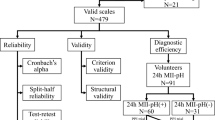Abstract
Laryngopharyngeal reflux (LPR) is a type of reflux, seen with complaints of hoarseness, chronic cough, and globus sensation, different from gastroesophageal reflux disease (GERD). The aim of this study was to evaluate the awareness, knowledge, and practices of family physicians and trainees who were being trained in medical branches other than ENT and to determine the effective factors on decision making for diagnosis of this disorder. The study was designed as a two-stage study. At the first stage, a data collection tool, involving 29 questions by which the knowledge, awareness, and applications of the physicians about LPR would be determined, was developed with 12 specialists, using Delphi method. At the second stage, 101 family physicians replied the questionnaire online. For 45 trainees other than ENT, the questionnaire was filled face-to-face by one of the investigators. In patients admitted with complaints of hoarseness, lasting longer than 2 weeks, cough, lasting longer than 3 weeks, and globus sensation, the physicians considered LPR as the preliminary diagnosis with rates of 88.4, 82.2, and 62.8 %, respectively. 87.0 % of physicians, participating in the study, started treatment for reflux empirically in patients having complaints of hoarseness, chronic cough, and globus sensation; however, only 29.0 % of physicians prescribed this treatment for periods of 3 or 6 months. 69.9 % of physicians, participating in the study, made a diagnosis of reflux in general during their daily practices; only 6.9 % made the discrimination between LPR and GERD. Of all physicians, 27.9 % prescribed double-dose PPI or H2.

Similar content being viewed by others
References
Karkos PD, Thomas L, Temple RH et al (2005) Awareness of general practitioners towards treatment of laryngopharyngeal reflux: a British survey. Otolaryngol Head Neck Surg 133:505–508
Belafsky PC, Postma GN, Koufman JA (2002) Validity and reliability of the reflux symptom index (RSI). J Voice 16(2):274–277
Koufman JA (1991) The otolaryngologic manifestations of gastroesophageal reflux disease (GERD): a clinical investigation of 225 patients using ambulatory 24-hour pH monitoring and an experimental investigation of the role of acid and pepsin in the development of laryngeal injury. Laryngoscope 101(53):1–78
Kamani Tawakir, Penney Susannah, Mitra Indu et al (2012) The prevalence of laryngopharyngeal reflux in the English population. Eur Arch Otorhinolaryngol 269:2219–2225
Printza A, Kyrgidis A, Oikonomidou E et al (2011) Assessing laryngopharyngeal reflux symptoms with the Reflux Symptom Index: validation and prevalence in the Greek population. Otolaryngol Head Neck Surg 145(6):974–980
Koufman JA, Aviv JE, Casiano RR et al (2002) Laryngopharyngeal reflux: position statement of the committee on speech, voice, and swallowing disorders of the American Academy of Otolaryngology-Head and Neck Surgery. Am J Otolaryngol Head Neck Med Surg 127:32–35
Gooi Z, Ishman SL, Bock JM et al (2014) Laryngopharyngeal reflux: paradigms for evaluation, diagnosis and treatment. Ann Otol Rhinol Laryngol 123(10):677–685
Thompson M (2009) Considering the implication of variations within Delphi research. Fam Pract 26:420–424
Keeney S, Hasson F, McKenna HP (2001) A critical review of the Delphi technique as a research methodology for nursing. Int J Nurs Stud 38:195–200
Davids T, Sommer DD, Armstrong D (2008) Survey of current perspectives on laryngopharyngeal reflux among Canadian otolaryngologists. J Otolaryngol Head Neck Surg 37(2):196–202
Ruiz R, Jeswani S, Andrews K et al (2014) Hoarseness and laryngopharyngeal reflux: a survey of primary care physician practice patterns. JAMA Otolaryngol Head Neck Surg 140(3):192–196
Chorti MS, Prokopakis EP, Lahanas VA et al (2013) Knowledge of primary care doctors about laryngopharyngeal reflux disease. B-ENT 9(1):53–56
Turley R, Cohen S (2010) Primary care approach to dysphonia. Otolaryngol Head Neck Surg 142(3):310–314
Book DT, Rhee JS, Toohill RJ et al (2002) Perspectives in laryngopharyngeal reflux: an international survey. Laryngoscope 112(8 Pt 1):1399–1406
Rafii B, Taliercio S, Achlatis S et al (2014) Incidence of underlying laryngeal pathology in patients initially diagnosed with laryngopharyngeal reflux. Laryngoscope 124(6):1420–1424
Feierabend RH, Shahram MN (2009) Hoarseness in adults. Am Fam Phys 80(4):363–370
Ford CN (2005) Evaluation and management of laryngopharyngeal reflux. JAMA 294(12):1534–1540
Vaezi MF (2005) Atypical manifestations of gastroesophageal reflux disease. Med Gen Med 7(4):25
Fraser AG, Morton RP, Gillibrand J (2000) Presumed laryngo-pharyngeal reflux: investigate or treat? J Laryngol Otol 114(6):441–447
Rosen CA, Anderson D, Murry T (1998) Evaluating hoarseness: keeping your patient’s voice healthy. Am Fam Phys 57(11):2775–2782
Acknowledgments
We thank the specialists; Adil Coskun, Emel Ceylan, Guzel Discigil, Cisen Eryigit, Sule Tas Gulen, Funda Goksoy, Can Ozbay, Mustafa Sahin and Yavuz Tokgoz who contributed to the first round.
Author information
Authors and Affiliations
Corresponding author
Ethics declarations
Source of funding
None.
Conflict of interest
The authors declare no conflict of interest.
Ethical approval
All procedures performed on human participants were by the ethical standards of the Institutional Research Committee and with the 1964 Helsinki declaration and its later amendments.
Informed consent
Informed consent was obtained from all individual participants included in the study.
Rights and permissions
About this article
Cite this article
Eryilmaz, A., Basal, Y., Gunel, C. et al. Awareness and daily practices of family physicians and trainees towards laryngopharyngeal reflux. Eur Arch Otorhinolaryngol 273, 4377–4384 (2016). https://doi.org/10.1007/s00405-016-4180-5
Received:
Accepted:
Published:
Issue Date:
DOI: https://doi.org/10.1007/s00405-016-4180-5




